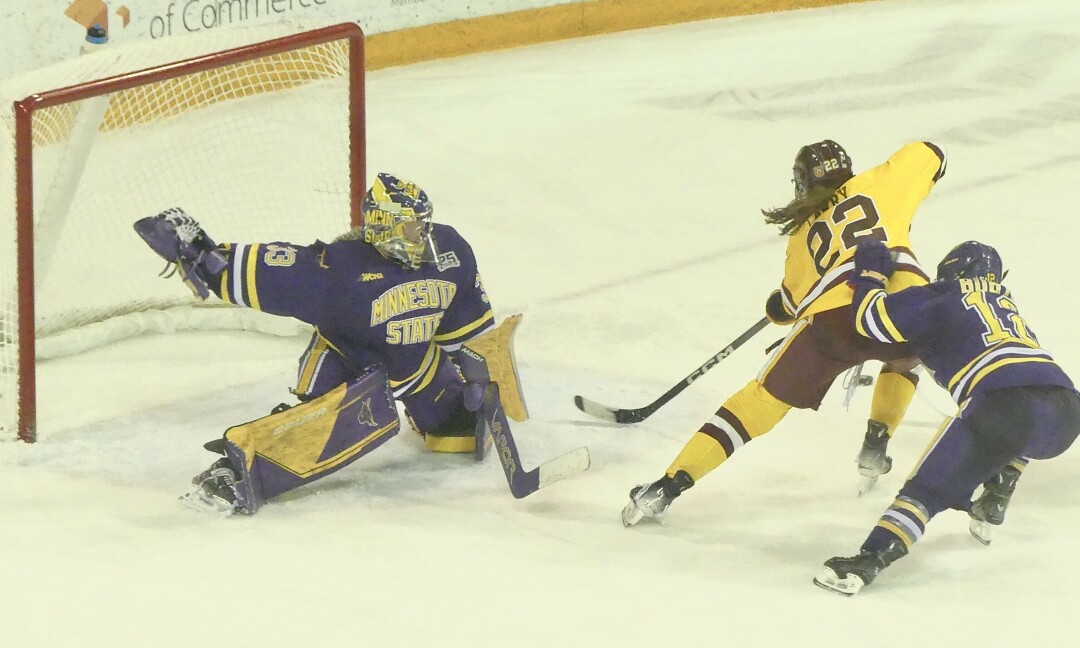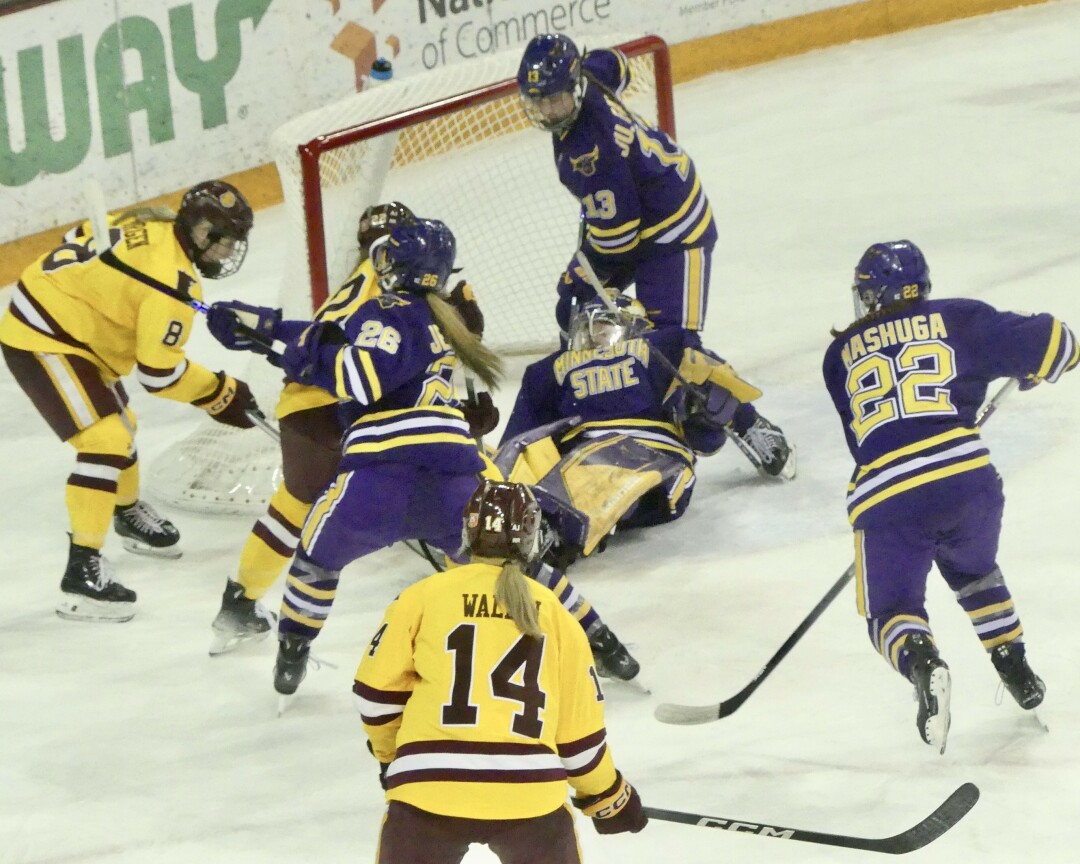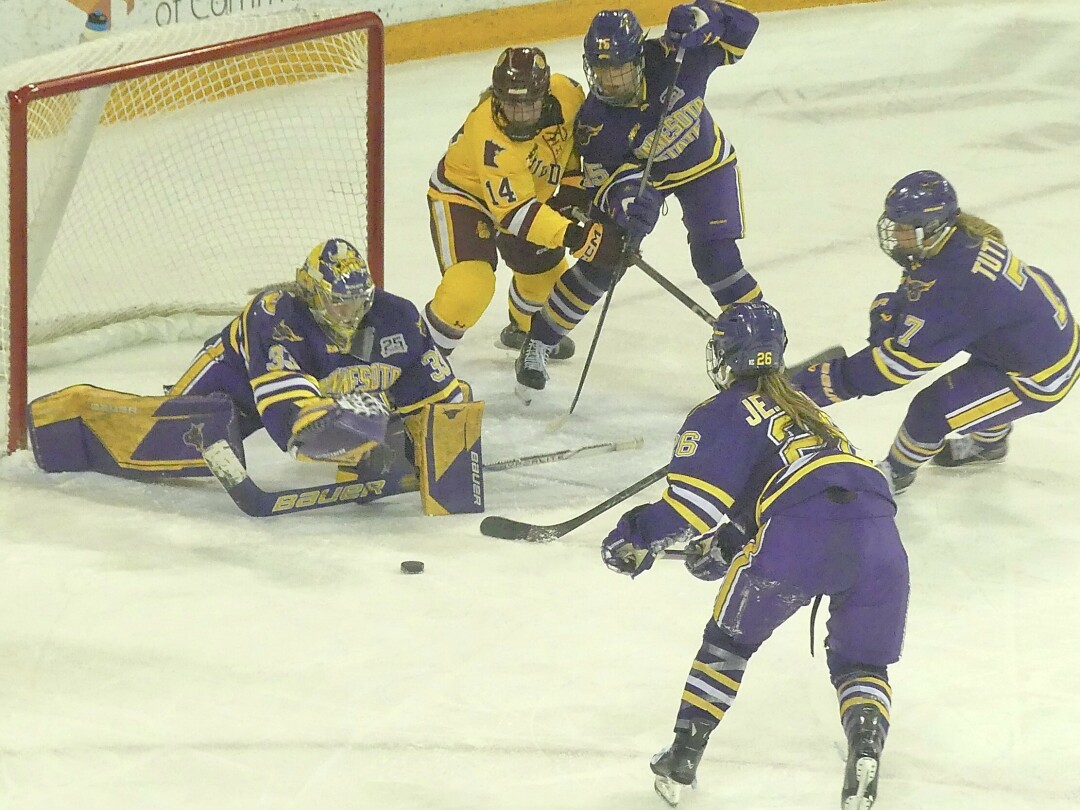News & Articles
Browse all content by date.

UMD's Jenna Lawry was foiled on breakaway in Game 2 by Mankato's left-handed freshman goalie Hailey Hansen. Photos by John Gilbert.
The date of Thursday, Feb. 1, 2024, might be remembered as the perfect day for holding reunions for hockey people throughout Northern Minnesota, from Duluth to Grand Rapids most specifically. Yes, a great day for hockey folks to gather and tell heart-warming stories about the game and its impact on our lives – but sometimes reunions are for all the wrong reasons.
The death of former coach Gus Hendrickson led to a funeral in Grand Rapids last Thursday, and at the same time, at Essentia Heritage Center Arena in West Duluth, a celebration of life was being held for Jim Ross, a former star center for Duluth East’s 1960 state championship team, who later played at Denver. He had been in hospice care for worsening dementia that finally exacted its final toll.
The first gathering sent me driving from Duluth to Grand Rapids for the funeral of Gus Hendrickson, one of my best friends ever in the sport of hockey, and who might best be remembered as the man who lifted Grand Rapids High School to elite status in Minnesota high school hockey.
Gus led the Indians to the 1975 state championship, causing me to nickname them the “Halloween Machine” for their flashy orange and black uniforms, which matched their colorful style of play. So impressive was the program Gus put together at Grand Rapids that UMD athletic director Ralph Romano made the bold decision to hire Hendrickson to go directly from high school to the WCHA and take over the fledgling program at UMD in the fall of 1975.
He brought his young Grand Rapids assistant, Mike Sertich, with him and they formed a tandem that reconfigured the Bulldogs, localizing the program with a nucleus of regional high school players from the Iron Range and Duluth.

UMD's Olivia Wallin (14) waits while teammates Danielle Burgen, left, and Jenna Lawry try to find rebound under MSU Mankato goalie Hailey Hansen – then Wallin poked the puck in for a 1-0 lead in the second-game 2-1 victory.
Many of those players attended Hendrickson’s services, having shared my sadness in learning that after Gus and his wife, Peg, of 62 years, had moved into an assisted living neighborhood in Grand Rapids, his health deteriorated. He was having trouble breathing, and when he told Peg about it, she suggested he might want to go sit in his recliner because he might sleep better there. Gus never made it, felled by a heart attack at age 83.
After services at Zion Lutheran Church, the congregation was invited for a reception at the Eagles Club. Gus’s son, Gustie, and his sisters, Mary Beth and Melissa, joined Peg, and the stream of former players was never-ending. The aura of sadness was lifted by recollections of Gus’s subtle humor in dealing with his players. I enjoyed talking to John Harrington, John Rothstein, Tim McDonald, Dan (Chocolate) Clafton, Jimmy Leone, Denny Doyle, brothers Mark and Pete DeCenzo, Steve Fleming, Mitch Corbin, Joe Parkman and Billy Baker.
And of course Keith Hendrickson, Gus’s nephew, who also played for Hendrickson at UMD. Baker and Harrington played on the 1980 U.S. Miracle on Ice Olympic gold medalists; Baker played for Gus at Grand Rapids before attending Minnesota, while Harrington played at Virginia before Hendrickson recruited him and future Olympic teammate Mark Pavelich of Eveleth to play at UMD.

Mankato goaltender Hailey Hansen got help in protecting goal from UMD in Game 1.
Former Bulldog Dave Johnson from Hibbing and I had a long conversation, about his days as a Bulldog and about his son, Adam Johnson, also a former UMD player, who died tragically from a skate cut to his throat in a professional game in England last October.
Mike Johnson came up to me and identified himself as having played for Gus’s 1975 Grand Rapids team. “I got hit in the eye with a puck,” he said, “and you wrote a story about me. I still have the story, and I thought if I ever met you, I’d thank you for it. So, thanks.”
The Gus Hendrickson story as coach at UMD deserves retelling. Romano had coached the first UMD teams in the WCHA, then he hired Bill Selman to take over while he focused on his other jobs as athletic director, ticket manager and sports information director. After two seasons, Romano relieved Selman of his job and gave it to former UMD player Terry Shercliffe.
That lasted five years, and after Grand Rapids won the state title, Romano hired Hendrickson to take over at UMD. The Bulldogs didn’t have automatic success under Hendrickson, but he lifted them into contention in the powerful WCHA, where their best year was 1978-79 when Pavelich, Harrington, Curt Giles and a solid lineup went 22-14-4 and finished third, behind league and NCAA finalists Minnesota and North Dakota.
Politically, there was some turmoil behind the scenes. Romano suggested to Hendrickson that he should fire Sertich as his top assistant. Hendrickson said they were best of friends and he would not do that. Hendrickson said he would quit, instead, but Romano wouldn’t accept it. That year, Cloquet had a future Olympian in Corey Millen, and his final choices were between UMD, where his dad, Dick, had been a basketball star, and Minnesota.
Shortly after Hendrickson’s discussions with Romano, Sertich came into Hendrickson’s office and said he was going to quit the program, right there in midseason. Gus confided in me that he didn’t want to accept it, but since Sertich wanted to quit and Romano wanted him gone, maybe he would just let it happen.

Sydney Langseth, right, scored Mankato's only goal of the series with 1:11 left, ruining Eve Gascon's shutout.
At the same time, Hendrickson started preparing a lengthy legal-pad journal spelling out all the things UMD had to do to assure the program could rise to being a top contender. It was something like 20 handwritten pages long, and Gus was still working on it. When the 1981-82 season ended, Gus called me and confided that his secret pad of ideas had vanished from his office — not on his desk or in its usual drawer. He was dumbfounded.
Shortly after that, Corey Millen decided to accept Minnesota’s scholarship offer. The next day, Romano called Hendrickson in and said: “Well, I’ll accept your resignation now.” Gus reacted by saying no way was he resigning at that point and that he was making plans for the future. Romano said: “Well then, I’m firing you, right now.”
Hendrickson was stunned. He walked back to his office and sat down in his desk chair. As he did, he noticed one drawer was slightly ajar. He pulled it open, and there was his pad-full of ideas to uplift the program. Whoever had taken it, had now returned it.
As a reporter at the Minneapolis Tribune, I was covering all college hockey, and I knew Romano wanted to hire the legendary John MacInnes from Michigan Tech, or Glenn (Chico) Resch, a former Bulldog goaltender who was nearing the end of his career with the New York Islanders. MacInnes showed interest, but it was only to negotiate a huge contract from Michigan Tech. Romano contacted Resch, who informed him he had decided to play one more season with the powerful Islanders.
So Romano was in a tight spot. He basically needed a coach to come in for one year — a disposable coach while he waited for Resch. In talking to Mike Sertich, I urged him to apply for the one-year interim job. He said he would never do that because Gus might think he had undermined him. I suggested that Gus would land on his feet, but Sertich would be unemployed a year down the road.
Finally, I convinced Mike to apply and that I would call Gus and explain what was happening. Sertich did apply, but I could never reach Hendrickson, who had left town and was impossible to track down. Gus had met a fellow who worked for Lutheran Brotherhood, and joked with him that someday he might want to go to work for him.
The two had a good laugh about that, but a couple of years later, it wasn’t a joke. Gus was highly successful selling insurance for Lutheran Brotherhood and moved his family to Michigan, where he became a regional supervisor. Romano hired Sertich — the man he considered disposable after one season — but amazingly, UMD went 28-16-1 in 1982-83, as the players he and Sertich had recruited continued to develop and Sertich was named WCHA coach of the year after the fourth-place finish.
Romano rehired him for another one-year contract, and UMD won the WCHA league title and Sertich won coach of the year again — losing a four-overtime 5-4 classic to Bowling Green in the NCAA semifinals. In 1984-85, Sertich again took the Bulldogs to the WCHA title and the NCAA final four, where they lost 6-5 in three overtimes to RPI in Detroit. Sertich won his third consecutive coach of the year award, and he was solidified as coach — although Romano never removed the “interim” tag on his title.
Whenever I introduce Sertie to anyone, I identify him as being the longest-standing interim coach in history — 19 years. Sertich and Gus both evolved to being coaches who have many constructive ideas and tips for all their players. Gus’s older brother, Dave Hendrickson, who had similar ideas and coached Sertich at Virginia High School, died a couple of years ago, and his funeral was the last time I saw Gus.
When he was dismissed by UMD, Gus never coached again, except to help out with various youth programs. For example, he coached the Duluth East Bantams one year when two of his first-year players were named Dave Spehar and Chris Locker. One year later, they both moved up and led East to the state high school title. By then, Gus and Peg had moved back home to Grand Rapids, where he also helped out in the youth program. I hated to leave Grand Rapids, but it’s an hour and a half back to Duluth. I got there too late to also stop at Heritage Center, so I missed the ceremonies for Jim Ross.
There are those who say Ross was the best player to ever come out of Duluth, and he did win the 1960 state championship with a group that included Dick Fisher, Bill McGiffert, Bill Savolainen, Don Hilsen, Bill Savolainen. I played youth baseball with Fisher, Savolainen, Hilton and others at Portman Square in Lakeside. But when Ross was recruited to Denver, it was a rare departure, but Denver didn’t play Minnesota, and most hockey fans lost contact with Ross and his outstanding play.
Hockey playoffs
Girls high school hockey has already moved into sectional playoffs this week, and at UMD, the Bulldogs pulled off a dramatic sweep over Minnesota State Mankato, winning 3-0 and 2-1, while St. Cloud State lost two tough games against Wisconsin. That boosted UMD to a 12-10 WCHA record, just two points ahead of St. Cloud State, which is 10-11-1, for fourth place. UMD plays two at St.Thomas this weekend, while St. Cloud State has a home-and-home against Minnesota, before the Bulldogs and Huskies have a showdown for the final home playoff spot.
The UMD men, after sweeping Miami, were themselves swept at Omaha and have this weekend off to heal up all the bumps and bruises before a final drive to try for home ice in the NCHC.
| Tweet |


